The Royal Society of New South Wales latest news:
The Royal Society of NSW and Learned Academies Forum 2023 – OUR 21st CENTURY BRAIN
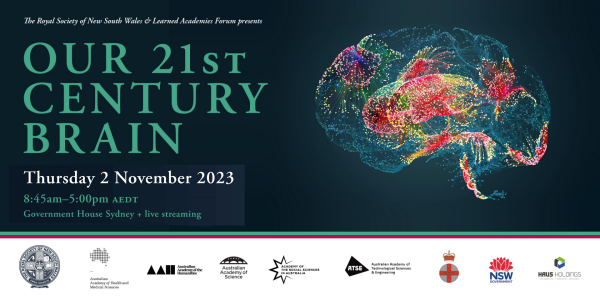 The Royal Society of NSW held its 2023 Royal Society of New South Wales and Learned Academies Forum at Government House Sydney on Thursday 2 November 2023. This year’s Forum focused on recent progress in unravelling the workings of the brain and opportunities to use our emerging understanding to promote human wellbeing well beyond the 21st Century.
The Royal Society of NSW held its 2023 Royal Society of New South Wales and Learned Academies Forum at Government House Sydney on Thursday 2 November 2023. This year’s Forum focused on recent progress in unravelling the workings of the brain and opportunities to use our emerging understanding to promote human wellbeing well beyond the 21st Century.
For more information and to access recordings of the event, please visit the RSNSW website.
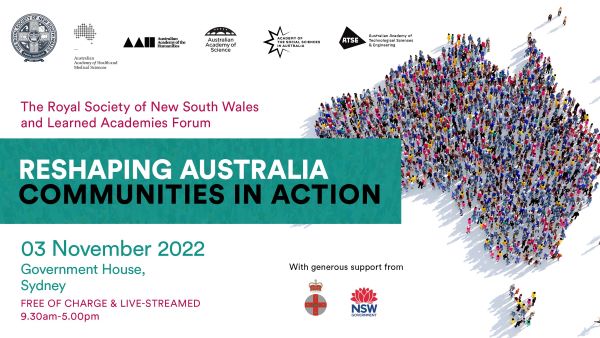 On Thursday 3 November 2022 the Royal Society of NSW, in partnership with Australia’s Learned Academies, will spend the day exploring the dynamic of communities in action. It will canvass some of the latest research on the factors shaping disparities in social, economic and well-being outcomes for Australians and address four key areas – health, education, infrastructure, and the environment.
On Thursday 3 November 2022 the Royal Society of NSW, in partnership with Australia’s Learned Academies, will spend the day exploring the dynamic of communities in action. It will canvass some of the latest research on the factors shaping disparities in social, economic and well-being outcomes for Australians and address four key areas – health, education, infrastructure, and the environment.
The Forum will highlight examples of community collaboration with business, not-for-profit, research, and government organisations to drive meaningful change. It will conclude with a consideration of how greater community participation might impact long-term policy development for the benefit of all Australians.
This is a livestreamed event. Free registration through Eventbrite is required.
YouTube and The Royal Society of New South Wales
At the tender age of 200, the Royal Society of New South Wales has launched their own YouTube Channel to make virtual events, lectures and performances freely available to the public. Take a look!
Society Fellow awarded Ecological Society of Australia Gold Medal
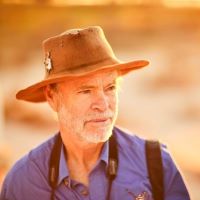 The Council of the Royal Society of NSW warmly congratulates one of its Fellows, Professor Richard Kingsford FRSN of UNSW Sydney, on being awarded a Gold Medal by the Ecological Society of Australia (ESA) for 2021. The Gold Medals awarded each year by the ESA recognise the impact of the work of leading Australian ecologists.
The Council of the Royal Society of NSW warmly congratulates one of its Fellows, Professor Richard Kingsford FRSN of UNSW Sydney, on being awarded a Gold Medal by the Ecological Society of Australia (ESA) for 2021. The Gold Medals awarded each year by the ESA recognise the impact of the work of leading Australian ecologists.
Professor Kingsford, who is a river ecologist and conservation biologist, and Director of the Centre for Ecosystem Science at UNSW Sydney, has made a significant contribution to understanding the impact of water resource developments on rivers and wetlands. He has worked extensively across the wetlands and rivers of the Murray-Darling and Lake Eyre Basins and leads the Eastern Australian Waterbird Survey, running since 1983 and spanning approximately one-third of the continent…read more.
NSW Government provides new sponsorship for the Society
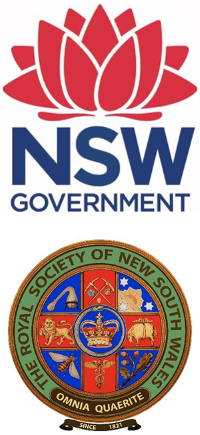 The Society is delighted to announce that the NSW Government, through the Office of the Chief Scientist and Engineer, is providing a three-year sponsorship for its ongoing operations.
The Society is delighted to announce that the NSW Government, through the Office of the Chief Scientist and Engineer, is providing a three-year sponsorship for its ongoing operations.
In announcing the sponsorship, the NSW Chief Scientist and Engineer, Professor Hugh Durrant-Whyte, said “The Royal Society’s stated mission is more important today than ever: ‘To contribute to a just, secure and sustainable society… by providing authentic and authoritative information and enlightenment on a wide range of subjects, addressing national and global challenges, and recognising and promoting excellence’ ”.
In thanking the NSW Government for its generous sponsorship, the Society President, Dr Susan Pond AM FRSN, noted that “it will allow Society to expand its vision of enriching lives through knowledge and enquiry, and importantly, support the Premier’s Priority of making a significant difference to the quality of life of the people of NSW.”
For further information, please see the press release issued by the Office of the NSW Chief Scientist and Engineer.
Attila Brungs FRSN FTSE named as next UNSW Vice-Chancellor
The Council of the Royal Society of NSW warmly congratulates one of its Fellows, Attila Brungs FRSN FTSE, on being named as the next Vice-Chancellor of the University of New South Wales (UNSW).
Professor Brungs, currently the Vice-Chancellor of the University of Technology Sydney (UTS) since 2014, has had a distinguished career in the academic, research and business sectors. He is a science graduate of UNSW, and has a PhD from the University of Oxford where he studied as a Rhodes Scholar. Before joining UTS as Deputy Vice-Chancellor (Research) in 2009, he spent seven years in senior roles at CSIRO in the areas of science investment and strategy and in business development, and four years at McKinsey and Co…read more.
Dr Susan Pond AM FRSN elected President of the Royal Society of NSW
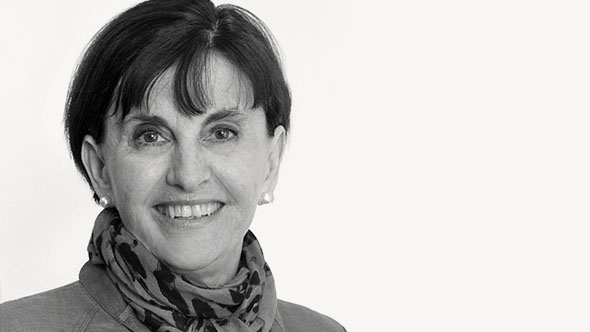
The RSA congratulates Dr Susan Pond AM FRSN on her recent election to the role of President of the Royal Society of NSW. She follows Emeritus Professor Ian Sloan AO FRSN FAA in the role. The RSA would also like to thank Professor Sloan for his support of the RSA during his three-year tenure of the role. See here for a message from Dr Pond about her new role.
Click for more news from the Royal Society of New South Wales
The Royal Society of Victoria latest news:
Surviving the Journey: Protecting Astronauts from Space Radiation
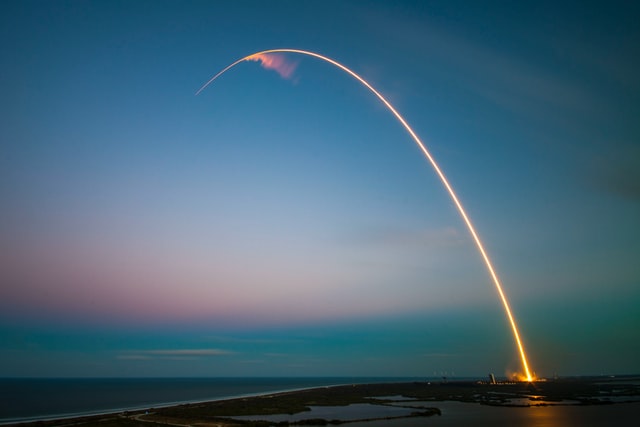 The vastness of space has beckoned many an adventurer. Yet with the exception of the Apollo astronauts, all astronauts thus far have never travelled outside of Low Earth Orbit. Remaining reasonably close to Earth, they are protected by its magnetic field. To travel further out would mean facing damaging cosmic and solar radiation.
The vastness of space has beckoned many an adventurer. Yet with the exception of the Apollo astronauts, all astronauts thus far have never travelled outside of Low Earth Orbit. Remaining reasonably close to Earth, they are protected by its magnetic field. To travel further out would mean facing damaging cosmic and solar radiation.
Outside the protective cocoon of the Earth’s magnetic field is a universe full of radiation. Unlike any of the radiation we encounter on Earth, space radiation consists of solar particles that burst out of the Sun at high speeds, and galactic cosmic rays that come from outside our solar system.
NASA’s Artemis Mission aims to send the first woman and next man to the Moon in 2024, but a lot of groundwork needs to first be done in order to make this a reality. Experimental physicist Dr Gail Iles works with RMIT University’s Space Science program, investigating ways to overcome the radiation barrier so that astronauts can survive long journeys, or even live indefinitely, in space…read more.
Why the world needs ecologists: a call to fight the extinction crisis
 A major threat to civilisation often goes ignored: the extinction crisis. And yet it is a crisis entirely of our own making as we continue to push nature to its limits. Around one million species are on the verge of disappearing off the planet, and the rate at which species become extinct is accelerating.
A major threat to civilisation often goes ignored: the extinction crisis. And yet it is a crisis entirely of our own making as we continue to push nature to its limits. Around one million species are on the verge of disappearing off the planet, and the rate at which species become extinct is accelerating.
‘Nature underpins all aspects of life,’ says Professor Brendan Wintle, the Director of the Threatened Species Recovery Hub. Ecosystems and their biodiversity provide numerous benefits to us by cleaning and purifying water and air, buffering storms and raging fires, storing carbon, supporting wildlife and healthy soils, and supplying food, water, materials, medicines, and important cultural and recreational spaces. But their ability to do so is rapidly diminishing…read more.
Let’s Torque – 2021 Competition Now Open
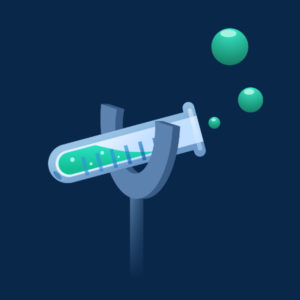 Looking for an effective way of boosting your networks, increasing your communication skills, and meeting like-minded students from other universities? Want an unrivalled chance at presenting at the Royal Society of Victoria in front of Science Communication employers and superstars?
Looking for an effective way of boosting your networks, increasing your communication skills, and meeting like-minded students from other universities? Want an unrivalled chance at presenting at the Royal Society of Victoria in front of Science Communication employers and superstars?
Welcome to Let’s Torque, a SciComm organisation for undergraduates, where you can participate in trivia events against other universities, attend state-of-the-art immersive workshops, and see SciComm like never before! Check out our newly opened Public Speaking competition (where you can compete for prize money and other winnings!), which has kickstarted the careers of many past competitors…read more.
The Royal Society of Queensland latest news:
General science newsletter now free online

The Queensland Science Network, a collaboration between some 26 scientific and natural history societies, publishes a free online Newsletter on a semi-regular basis. The full set is available on the QSN website. Members of the public are warmly invited to subscribe. Please send any items of general science interest to the Editor Mr Col Lynam by email (newsletter AT scienceqld.org) for inclusion in the next issue.
Research Fund applications now open
For the 2021 round, Round 4, the guidelines has been amended to encourage applications from students as well as from citizen science groups. Students will need to demonstrate that the additional funds will allow work additional to what would be carried out otherwise. Citizen groups will need to secure the support of a research institution accredited by the Australian Tax Office as a Type I DGR. The revised Guidelines for Applicants and the abbreviated Application Form explain the selection criteria. Applications close on 31 August 2021. See Research page for more details.
Annual edition of Proceedings now published
All articles in the second edition of the Proceedings of the Royal Society of Queensland for 2020, Volume 128, have now been published online. These are available on an open-access basis free of charge, under Creative Commons conditions.
All articles destined for this issue have been typeset and are en route to printing. Printed copies will be available for a cost of $35 plus $10 postage.
“Springs of the Great Artesian Basin” published
 A Special Issue of the Proceedings of The Royal Society of Queensland has been published. All articles are available free of charge online at www.royalsocietyqld.org/2020-springs-special-issue-vol-126/.
A Special Issue of the Proceedings of The Royal Society of Queensland has been published. All articles are available free of charge online at www.royalsocietyqld.org/2020-springs-special-issue-vol-126/.
This is an outstanding work of scholarship and policy that includes scientific papers and opinion pieces, from a range of historical and contemporary perspectives. A limited number of printed copies is available for purchase: see www.royalsocietyqld.org/purchases/.
The Society anticipates that the volume will be an important work of reference to all those with an interest in the Great Artesian Basin as they grapple with the best methods of managing and conserving it.
Publications available
 Orders are being taken for several issues of the Proceedings of The Royal Society of Queensland:
Orders are being taken for several issues of the Proceedings of The Royal Society of Queensland:
Volume 125 –The Land of Clouds Revisited: The Biodiversity and Ecology of the Eungella Rainforests – $35 plus $10 postage.
Volume 126 – Springs of the Great Artesian Basin – $50 plus $15 postage.
Volume 127 – A Rangelands Dialogue: Towards a Sustainable Future – $35 plus $10 postage.
Volume 128 – Regular annual issue 2020 – $35 plus $10 postage.
The table of contents of each of these printed works is or will soon be available on the Proceedings page.
Please proceed to the Purchases page to make payments.
Click for more news from the Royal Society of Queensland
Other Australian Royal Societies:
The Royal Society of Tasmania
The Royal Society of South Australia
The Royal Society of Western Australia

